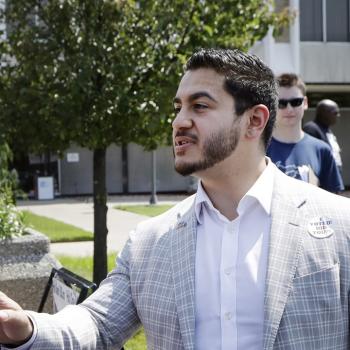 |
|
I’ve got a date tonight
|
Ramadan is, first and foremost, a time for spiritual awareness and enrichment for Muslims. The means to do so may be enshrined in withholding the needs of one’s body, but increased taqwa, or God-consciousness, is the ideal. Still, the absence of food and drink during daylight hours ensures that both get special attention the evening (and pre-dawn) hours. And in American Muslim life, replete with the multitasking frenzy that our modern society now demands, what we consume and how we consume it can make the difference between exhaustion and enlightenment – of both our spiritual selves and our culinary landscapes.
We spoke with Yvonne Maffei, publisher of the My Halal Kitchen blog, to find out how Ramadan has adapted to American culture, from the mosque, to the kitchen, to the supermarket.
![]() Many people admit that they gain weight during Ramadan – a paradox considering the long hours going without food. What does Ramadan generally mean for the American Muslim diet these days?
Many people admit that they gain weight during Ramadan – a paradox considering the long hours going without food. What does Ramadan generally mean for the American Muslim diet these days?
I think people, irrespective of religious faith, are beginning to learn the benefits of fasting, also referred to as detox in mainstream health news and media. Many other forms of fasting exist that weigh in as part of a diet, as well, so perhaps the American Muslim has a greater appreciation for the obligatory fasting during Ramadan, serving as a reminder that everything ordained for us is also good for us.
As far as weight gain during Ramadan, it’s hard to give a blanket reason why some people gain and others remain the same or even lose weight during Ramadan. Each person has a different metabolism and different habits for both eating and drinking. The type of food consumed (all natural vs. unhealthy foods) also play a role in how our bodies metabolize what we eat. An improper or erratic sleep schedule can really affect weight gain at any time and Ramadan is no different just because we’re fasting. I’d say if people are gaining weight during Ramadan, there may be more factors than just the amount of food being consumed.
![]() With all the time and sleep constraints, are there ways to find time to prepare balanced meals at home for suhoor and iftar?
With all the time and sleep constraints, are there ways to find time to prepare balanced meals at home for suhoor and iftar?
There’s really no set rule of thumb for when is the best time to prepare anything, in my opinion, but there is a ton of barakah (blessings) during the early morning hours surrounding fajr. Since we should be awake for suhoor, anyway, that’s a great time to get things ready for the evening iftar and make preparations for leftovers or other foods – such as boiled eggs, cut fruit, etc. – for the following day’s suhoor.
If this isn’t a good time, then add meal prep to your daily schedule just like you would any other type of important activity. For more suggestions on how to prep and organize for Ramadan, please see my articles on the topic.
![]() Are there food products that help bridge the gap between convenience and healthy eating?
Are there food products that help bridge the gap between convenience and healthy eating?
I am super excited this year to be able to add great quality, completely halal and convenient food to my pantry. Saffron Road, a brand of the American Halal Co., has made available some superb frozen entrees and kid-friendly chicken products as well as all-halal, certified humane chicken broth and vegetable broth. Although I love to cook myself and even make my own homemade stock for soups, I simply don’t have the time to always have these items readily available, especially during a busy time like Ramadan. Because we’re fasting and need extra-healthy food to nourish us, I feel totally at ease using these products as an addition to meals served to family and guests (even those on gluten-free diets) for iftar.
![]() Do you find that American Muslims are looking beyond their ancestor’s countries for culinary inspiration? What are some uniquely American adaptations of iftar meals?
Do you find that American Muslims are looking beyond their ancestor’s countries for culinary inspiration? What are some uniquely American adaptations of iftar meals?
I think that American Muslims are combining the best of both worlds in their food choices. I get such a kick out of iftar gatherings where I see South Asian-spiced salads or pasta or foods like hummus on all-American sandwiches and appetizers.
I have seen (and made) dishes that are all-American yet borrowed from earlier immigrants like lasagna with turkey sausage as opposed to pork sausage, taco bar spreads made from pulled lamb, beef and chicken, and even good-old mac n’ (halal) cheese. Does it get more American than that?
The beauty of our ummah is that we’re not only diverse in culture, but we’re able to enjoy and benefit from those differences over such a uniting element as food!
![]() What other tips and tricks would you suggest for making Ramadan more enjoyable with regards to food?
What other tips and tricks would you suggest for making Ramadan more enjoyable with regards to food?
Food is more enjoyable when it’s shared, and eating with someone else (even if only one other person) is recommended in Islam.
My friends and I have made it a tradition to have at least one cultural-specific iftar dinner together during Ramadan. Last year we planned then delegated dishes and prepared a Spanish iftar with food like paella, tortilla, mixed olives, fruit drinks and more; this year we had a Cuban iftar with no-pork Cuban sandwiches, seafood, fried plantains and Cuban coffee. It was so much fun I decided to then host a potluck Mexican iftar where everyone brought something to add to our taco bar where the main courses were pulled lamb, chicken and chipotle beef. These have been such amazing bonding experience because everyone enjoyed being part of the process and we made it fun, even for the kids. I know we all feel closer having done that, alhamdullilah.
There is wisdom in breaking bread together, as we form bonds of meals with our family, our friends and our community. I think even going a step before that and helping in food preparations together whether it’s at a friend’s home or at the masjid (mosque) for a community iftar makes a huge difference in how much more it means to those who put their time, effort and sincere heart into feeding those who are fasting and being the ones who are fed.
![]() Finally, you participated in a promotion for halal products at Whole Foods Market recently that resulted in the company being challenged on its decision to promote halal products during Ramadan. Can you give us your thoughts on the situation?
Finally, you participated in a promotion for halal products at Whole Foods Market recently that resulted in the company being challenged on its decision to promote halal products during Ramadan. Can you give us your thoughts on the situation?
Whole Foods did an amazing job at keeping the public informed in real time by using social media to counter any rumors that the campaign had been cancelled. It was a bit confusing to read the headlines of blogs and papers discuss a campaign being cancelled when the online campaign – with weekly giveaways on My Halal Kitchen – was the only type of campaign I was aware of. It seemed as though so much information was being publicized without verification of facts or statements by Whole Foods first.
Overall, the online campaign sponsored by Whole Foods, Saffron Road Foods and hosted by My Halal Kitchen to offer readers some really generous giveaways has been a great success, and we’re not even done yet! We’re so grateful that there’s more support for it than ever – and hats off to Whole Foods for carrying great quality halal products in their stores and reaching out to consumers through this unique campaign to promote them.
Zahed Amanullah is Executive Editor of altmuslim.com














